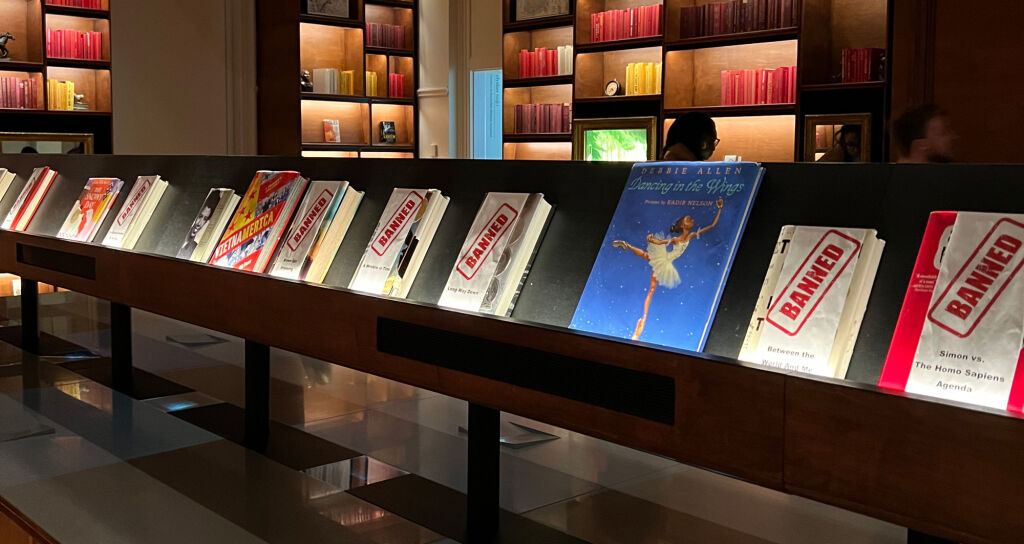Shakespeare at Planet Word
When we started planning Planet Word, since no one had ever visited a word museum, people had lots of assumptions about what it would be like.
One of the most-often asked questions we get is whether we’ll have a lot of exhibits about Shakespeare.
And we had to tell people that, no, Planet Word is built on experiences with words and language of all kinds, so our galleries don’t focus on a single author or a single topic of scholarship.
But as it turns out, Shakespeare has visited Planet Word even if we didn’t visit Shakespeare.
On this, his proclaimed 456th birthday — there’s still a bit of controversy whether this is actually the date or not — we thought we might celebrate this inescapable giant of words, by showing you all the ways he’s made his presence known at Planet Word.

Colorful displays on the talking word wall illustrate the story of the English language
Right away, in our first gallery, called “Where Do Words Come From?”, Shakespeare makes a big appearance. In this gallery, about the origins of words in the English language, you’ll talk with a towering, 22-foot-high wall of 1200 3-dimensional words — and it will talk back to you, responding to your requests with stories about all sorts of ways words have entered English, including through our own invention.
Our talking Word Wall traces the ways that Shakespeare added some thousand words to the English lexicon — he may not have invented them all, but he was the first to write them down. So next time you use a brand new Covid-19 word invention — like super-spreader or social-distancing or the acronym WFH, imagine yourself part of a long line of people, including Shakespeare, who add words to English when we need new terms to describe the world around us.
Shakespeare also makes a cameo appearance in our magical Library gallery, where we are bringing books of all genres and for all ages to life. Through the wonders of projection technology, you’ll watch characters emerge from illustrations or hear celebrities tell why that book was important to them or see cookbook recipes sizzling on the table in front of you. In this gallery, Shakespeare is represented by “A Midsummer Night’s Dream .”

A prototype of “A Midsummer Night’s Dream” coming to life in Planet Word’s magical library
And in the library’s Poetry Nook, where visitors will enjoy hearing and seeing the words of 50 poems, from Chaucer through the most contemporary spoken word poetry, of course we had to include a sonnet by the bard.
In our humor gallery, visitors will tell jokes to each other and keep score as they try to make each other laugh. They can take selfies with a 3-D prop to bring a funny pun or idiom to life. And here again, Shakespeare has left his mark — one of the idioms you can act out is “in a pickle,” which is an expression from Shakespeare’s play The Tempest. You can put yourself inside a big cutout pickle and see if your friends can guess the phrase you’re acting out. And some of the jokes in the gallery are knock-knock jokes, and believe it or not, the phrase “knock knock” comes out of Macbeth.
Even in our advertising copywriting gallery, “I’m Sold,” we show how two different ads, one for an Apple computer and one for Oxford University Press, played on that most famous line from Hamlet, “to be or not to be,” to make their copy fun and memorable.
So thanks for stopping by Planet Word, Will. We know you’ve made our museum richer for your presence. And Happy Birthday!
— Ann Friedman, founder, Planet Word



